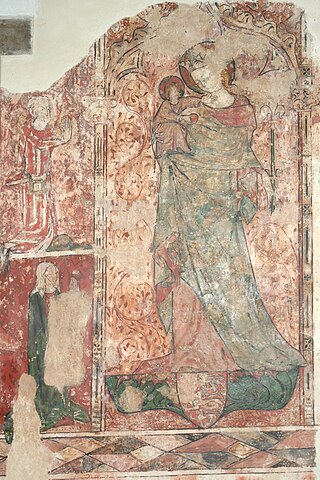Lullay, mine liking
Middle English lyric poem or carol From Wikipedia, the free encyclopedia
"Lullay, mine liking" is a Middle English lyric poem or carol of the 15th century which frames a narrative describing an encounter of the Nativity with a song sung by the Virgin Mary to the infant Christ.[1] The refrain is an early example of an English lullaby; the term "lullaby" is thought to originate with the "lu lu" or "la la" sound made by mothers or nurses to calm children, and "by" or "bye bye", another lulling sound (for example in the similarly ancient Coventry Carol).[2]

There are a number of surviving medieval English verses associated with the birth of Jesus which take the form of a lullaby, of which this is probably the most famous example.[2] Written by an anonymous hand, the text is found uniquely in Sloane MS 2593, a collection of medieval lyrics now held in the British Library.[3]
Originally intended to be sung, no evidence of the work's musical setting survives, and since its rediscovery and the musical possibilities suggested by the text have led to diverse interpretations by numerous composers including Philip Stopford, Edgar Pettman, Peter Warlock, R. R. Terry, Gustav Holst, Ronald Corp, David Willcocks, Philip Lawson and Richard Rodney Bennett.
These are sometimes titled "I saw a fair maiden" whereas "Myn Lyking" is used in the versions by R.R. Terry and Ronald Corp (as the first of the latter's Three Medieval Carols).[4]
Text
| Middle English original spelling[5] | Middle English converted[6] | English modernisation[7] |
|---|---|---|
| Refrain Lullay, myn lykyng, my dere sone, myn swetyng, |
Refrain |
Refrain |
|
I saw a fayr maydyn syttyn and synge, |
I saw a fair maiden, sitten and singe, |
I saw a fair maiden, sitting and sing, |
|
That eche lord is that that made alle thinge, |
That eche lord is that that made alle thinge; |
That very lord is He that made all things |
|
Ther was mekyl melody at that chyldes berthe, |
There was mekel melody at that childes berthe; |
There was mickle (much) melody at that Child's birth, |
|
Aungelebryt thei song that nyt and seydyn to that chyld, |
Aungele bright they song that night, and seiden to that child, |
Angels bright they sang that night and saiden to that Child, |
|
Prey we now to that chyld, and to his moder dere, |
Prey we now to that child, and to his moder dere, |
Pray we now to that Child, and to His mother dear, |
See also
References
Wikiwand - on
Seamless Wikipedia browsing. On steroids.
